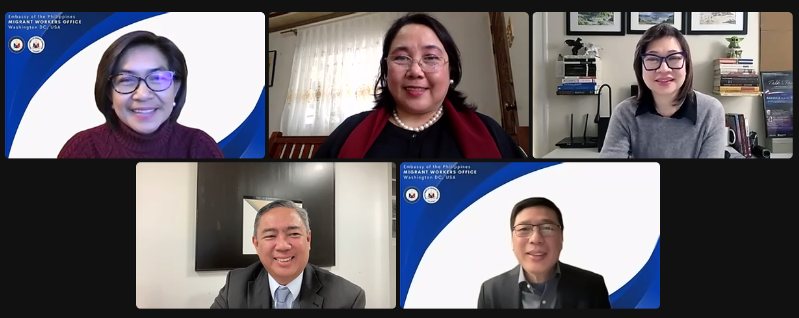Webinar series promotes human trafficking awareness
WASHINGTON D.C.—As part of the Philippines’ campaign against human trafficking, the Philippine Embassy recently held the second part of a webinar series that aims to help protect Filipinos from unscrupulous recruiters.
In his opening remarks, Consul General Iric Arribas said the Philippine government wants to ensure that Filipinos abroad are well-informed about the laws and regulations governing labor deployment.
“While everyone has the right to seek economic improvement globally, our collective goal is to make your experience abroad both pleasant and meaningful – for your well-being and that of your families,” Arribas said.
He said overseas migration must take place in a “secure, orderly and regulated manner.”

The four-part webinar series was organized by the Embassy of the Philippines, in collaboration with the Embassy’s Migrant Workers Office and the International Pro-Bono Alliance, Inc. (iBPA). The panelists included (from upper left, clockwise) Assistant Labor attache Marie Josephine Borromeo, iBPA President Purificacion “Pingki” Bartolome-Bernabe, US Immigrant Rights Advocate Cristina Godinez, Labor Attache Saul De Vries and Consul General Iric Cruz Arribas. CONTRIBUTED
Arribas acknowledged that more work has to be done to stop “unscrupulous elements from targeting vulnerable job seekers.”
The four-part webinar series was organized by the Embassy of the Philippines, in collaboration with the Embassy’s Migrant Workers Office and the International Pro-Bono Alliance, Inc. (iBPA).
Lawyer Purificacion Bartolome-Bernabe, president of iPBA, talked about the elements of human trafficking as outlined in the UN Protocol to Prevent, Suppress and Punish Trafficking in Persons.
Tier 1 status
She underscored the important role of the Philippines’ Inter-agency Council Against Trafficking (IACAT) in maintaining the country’s Tier 1 ranking in the 2023 US Trafficking in Persons report.
Tier 1 is the highest in the three-tier ranking and indicates that a country fully meets the minimum standards for the elimination of trafficking. The Philippines has kept this status for eight consecutive years.
Cristina Godinez, a New York-based lawyer and migrant rights advocate, discussed notable trends in human trafficking, particularly in the post-pandemic landscape.
She talked about US laws on trafficking, covering the prosecution of traffickers, protection of victims and prevention of human trafficking.
The 2023 US Trafficking in Persons report said the Philippine government continued to “demonstrate serious and sustained efforts” to combat human trafficking.
These efforts included investigating more trafficking crimes, convicting more traffickers, amending its anti-trafficking law and increasing funding to the Inter-Agency Council Against Trafficking.
However, the report also noted that the Philippine government “did not vigorously investigate or prosecute labor trafficking crimes.”
“The government identified fewer victims and prosecuted fewer traffickers,” the report said. “Corruption and official complicity in trafficking crimes remained significant concerns, inhibiting law enforcement action during the year.”

